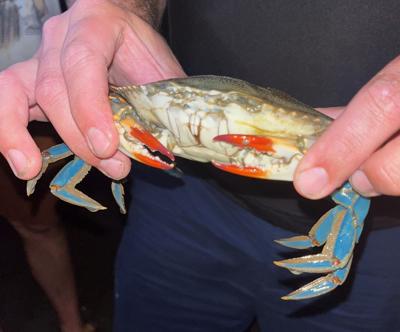One of our top environmental concerns is the declining number of blue crabs along South Carolina's coast in recent years, particularly as neighboring states have regulated this important fishery, driving more crabbers toward our waters and creating what some have referred to as a crab Wild West here.
Fortunately, a House subcommittee is considering a Senate-passed bill this morning that could improve the status quo by placing new restrictions on both commercial and recreational crabbing. We urge the Wildlife Subcommittee to approve the bill and for the Agriculture, Natural Resources and Environmental Affairs Committee to move quickly to send it to the House floor and ultimately on to Gov. Henry McMaster's desk before this session ends May 9.
A rising chorus of voices has been speaking out about the health of the blue crab population. Only three decades ago, our state recorded about 6 million blue crabs caught a year, but the annual catches in recent years have been only about half that, with 2023 numbers marking the lowest recorded in 50 years. That's a serious concern, as our state's blue crab fishery is one of our most profitable. And crabbing is also a recreational mainstay: a relatively easy way for anyone along the coast to try to catch dinner, since all that's needed is a string, a bucket and a turkey neck.
S.955 would take several steps to allow the state Department of Natural Resources to provide more protection to the crabs, including the temporary closure of parts of the coast to crab harvesting under certain conditions. It also would require commercial fishers of blue crabs to obtain a limited commercial blue crab license, a commercial saltwater fishing license and a commercial equipment license for traps. The number of licenses would be capped at 100 annually; those who can document harvesting crabs commercially during a recent year would get priority, while others would be subject to a lottery system.
Recreational crabbers would be allowed at least two traps, and up to five traps if they pay an extra $5 on their saltwater fishing license for a recreational crab trap endorsement. Either way, they would be limited to catching no more than a bushel per day (a boat with more than one person would be limited to two bushels per day; a bushel is about 60-70 crabs, or about 40 pounds). Violators would face a fine of between $100 and $500. These are all measured, reasonable limits.
Ensuring the health of the blue crab population in our state's waters affects far more than the people who catch and eat them. As the bill's lead sponsor, state Sen. Chip Campsen, tells us, blue crabs "are the foundation of the marine ecosystem. Everything eats crabs, pretty much."
The bill would improve the status quo, but the state's regulation of the blue crab fishery also needs to be nuanced and subject to tweaking as we learn more, including better information about the health and numbers of blue crabs along our coast.
That's why we repeat our call to lawmakers to give DNR the necessary funding to improve its blue crab-focused biological, population and fishery data collection. As new regulations take effect, better data will help ensure we're striking a responsible balance between the health of the blue crab population and the needs of those whose livelihood hinges at least in part on catching and selling them.
Click here for more opinion content from The Post and Courier.



